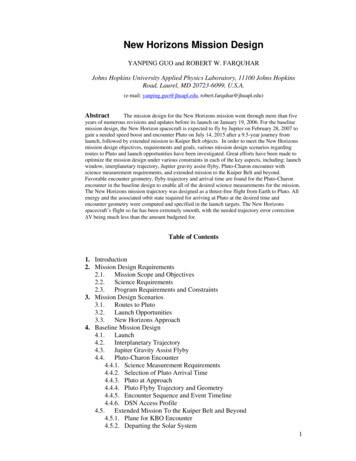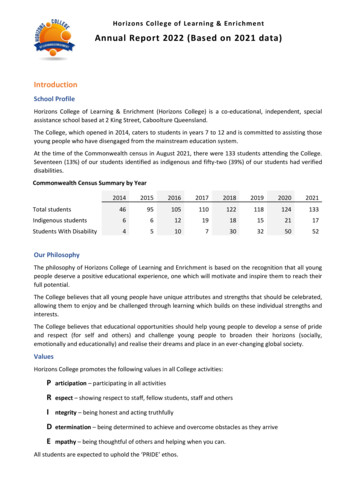
Transcription
New HorizonsTowards a shared visionfor mental healthConsultation
DH INFORMATION READER eClinicalEstatesCommissioningIM&TFinanceSocial Care/Partnership WorkingDocument purposeConsultation/DiscussionGateway reference11640TitleNew Horizons: Towards a shared vision for mental health: ConsultationAuthorDepartment of Health: Mental Health DivisionPublication date23 July 2009Target audiencePCT CEs, NHS Trust CEs, SHA CEs, Care Trust CEs, Foundation Trust CEs,Medical Directors, Directors of PH, Directors of Nursing, local authority CEs,Directors of Adult SSs, PCT Chairs, NHS Trust Board Chairs, Special HA CEs,Directors of Finance, allied health professionals, GPs, communications leads,emergency care leads, Directors of Children’s SSs, public health leads andspecialists, National Mental Health Development UnitCirculation listOrganisations of services users, other government departments,headteachers, employers, Royal CollegesDescriptionNew Horizons: public consultation on a new vision for mental health and well being to help develop the promotion of mental health and well-being acrossthe population, improve the quality and accessibility of services, and to enableSHAs to deliver their regional visions, in a way that reflects the changednature of the NHSCross refN/ASuperseded docsNational Service Framework for Mental HealthAction requiredN/ATimingPublic consultation closes on Thursday 15 October 2009Contact detailsNew Horizons Programme AdministratorMental Health Division, Wellington HouseSCLGCP Directorate133–155 Waterloo RoadLondon SE1 8UGFor recipient’s use
ContentsMinisterial foreword2Key themes3Our vision4Introduction and executive summary8Main sections:1 Guiding values182 Laying the foundations283 Transition from adolescence to adulthood384 Better mental health and well-beingfor adults445 Better mental health care for adults586 Older adults787 How we will get there96References109The consultation process121Consultation questions1241
Ministerial forewordI am proud and pleased to present forconsultation New Horizons: Towardsa shared vision for mental health.productivity and getting maximumvalue for individuals and communitiesfrom the resources we invest.Good mental health is fundamentalto the well-being and prosperity ofour nation. And we know it is linkedwith good physical health and manyother benefits for individuals andcommunities.We are entering an exciting period inhealth and social care, when peoplewill increasingly have more controlover their health, their care andtreatment. More and more, the jobof professionals will be to supportthem in this. Our job in governmentis to help set this direction, while atthe same time recognising theparticular challenges in mental health.The radical reform of mental healthservices in England over the last 10years has been a real success story– not only has investment in theseservices increased, accounting foralmost one pound out of every seventhat the NHS spends, but also thequality of care they offer has improvedand is recognised internationally.Our blueprint for this transformationhas been the 1999 National ServiceFramework for Mental Health (NSF),but it is fast approaching the end ofits 10-year lifespan. Now we needa new approach: one that builds onthe NSF’s successes by supportingthe local development of higherquality, more personalised services,and that also moves the agenda onby building a cross-government,multi-agency alliance that can tacklethe root causes of poor mental healthand get support to people whereand when they most need it. NewHorizons sets out to do just that.The world has changed since 1999,and we cannot depend on the scaleof extra investment that followed inthe wake of the NSF. We do not needto. In New Horizons we discuss howwe could make enormous progressby raising our game on prevention,intervening earlier, being moreinnovative and collaborative, improving2I want New Horizons to make a bigdifference to the way we promoteequality. There are inequalitiesin mental health and in access toservices. People with mental healthproblems still experience unjustifiablediscrimination and avoidableinequalities in their physical health.New Horizons will build on andextend the excellent work that hasbegun in those areas in recent years.The process of developing NewHorizons started almost two yearsago, and I am immensely gratefulto the coalition of partners in theprofessions, third sector, health servicesand local government whose helpand advice have been essential ingetting us to this point. I hope manymore people will respond now withtheir views and ideas. Together, wecan create a vision that guides us toa healthier, fairer and equal society.Phil Hope, MPMinister of State for Care Services
Key themesFor more than 18 months, the NewHorizons team and I have beenmeeting with a wide range of peopleup and down the country. We’vebeen listening to their hopes, ideasand aspirations for the future ofmental health in England from 2010.A wide spectrum of views and ahuge number of good ideas havebeen forthcoming from people whouse mental health services, fromcarers, commissioners, cliniciansand many more besides. Combiningthis with growing evidence aboutwell-being and resilience, as well aslearning from the best services in thecountry today, we have producedthis report as a basis for furtherconsultation.Already, a number of key themesare emerging: prevention and public mentalhealth – recognising the need toprevent as well as treat mentalhealth problems and promotemental health and well-being multi-agency commissioning/collaboration – working to achievea joint approach between localauthorities, the NHS and others,mirrored by cross-governmentcollaboration innovation – seeking out newand dynamic ways to achieve ourobjectives based on research andnew technologies value for money – delivering costeffective and innovative services ina period of recession strengthening transition –improving the often difficulttransition from child andadolescent mental health servicesto adult services, for those withcontinuing needs.We are keen to know what you thinkare the answers to the questionswe face, so please spare sometime, if you can, to respond to theconsultation. See pages 121–123 forhow to respond in writing, online orvia a local or national organisation. stigma – strengthening our focusAnd thank you for your interest andon social inclusion and tacklinginvolvement.stigma and discrimination whereverthey occur early intervention – expanding theprinciple of early intervention toimprove long-term outcomes personalised care – ensuring thatcare is based on individuals’ needsand wishes, leading to recoveryLouis ApplebyNational Clinical Directorfor Mental HealthPERSONALISATION BEING IN CONTROL OF OUR LIVES RECOVERY & HOPE3
Our visionOur mental health, like our physical health, will varythroughout our lives – whether we’re young or old,working or not, whatever we do and wherever we live.It is important that we all understand what we need todo to build and maintain good mental health right fromthe start, from infancy into adulthood and older age, forindividuals, families and communities.In 2020 most adults will understand theimportance of mental well-being to theirfull and productive functioning in society,to their physical health and to their abilityto make healthy lifestyle choices. They wi llalso understand some of the factors thataffect their mental well-being, and will havedeveloped their own everyday ways for takingcare of it. Children will increasingly be taughtin school about the importance of mentalwell-being and how to nurture and preserve it.In 2020 most adults will understand theimportance of mental well-being to theirfull and productive functioning in society,to their physical health, and to their abilityto make healthy lifestyle choices. They willalso understand some of the factors thataffect their mental well-being, and will havedeveloped their own everyday ways for takingcare of it. Children will increasingly be taughtin school about the importance of mentalwell-being and how to nurture and preserveit, and a range of local services will supporttheir well-being so that problems are detectedearly. Mental health needs will be identifiedat an early stage so that, for example,treatment and support can be provided whilethe individual is an adolescent, thus reducingthe chances that mental health problems willcontinue and adversely affect their adult life.In 2020 physical health and mentalwell-being will be seen as equal priorities,and the links between them recognised askey to maintaining physical and mentalhealth. Lifestyle and well-being services willbe widespread. Psychological and familytreatments will be available to all who couldbenefit from them. Drug treatments will beindividually tailored so they have fewer adverseeffects. Services will use innovative technologiesto promote independent living and theeffectiveness of treatment.Personalised servicesPeople with mental health problems, andthose at risk, will receive personalised carepackages designed to meet their individualneeds. They will be able to make decisionsabout their care, treatment and goals forrecovery, as well as to monitor their owncondition.EqualityIn 2020 all individuals will be treated withrespect in an inclusive society, whatever theirage, background or circumstances. Publicservices will recognise the importance ofenvironments, services and amenities thatmaximise independence and opportunitiesfor older people to participate and contributeas equal, active citizens. Services will beattuned to the needs and wishes of individualsand communities and will actively promoteequality. Inequalities for black and minority4
ethnic groups in access to and experience ofmental health care will have disappeared.who need them, will be based on the bestavailable evidence, and will be aimed atregaining hope and recovery of psychologicaland social functioning and good physicalhealth. The effectiveness and acceptability ofservices will be assessed frequently, againstindicators agreed between individual cliniciansand their patients, and used to help the serviceuser plan their next steps towards recovery, aswell as to monitor their progress. Recoverybased services will ensure that people unableto work because of mental health problemswill have opportunities to take part in meaningfulactivities and to contribute to and participatein society.Stigma and understandingIn 2020 the stigma attached to mentalhealth will have declined dramatically. Peoplewill know that mental health problems canaffect anyone, at any time, and they will alsounderstand that these problems have causesand can be treated, just like physical illnesses.People will know some of the signs to lookout for in themselves and in their friends andfamilies and will have a better understandingof how an interplay of several factors canlead to psychological, social and physicaldifficulties. They will know that treatmentsgive most chance of recovery if help is soughtearly. They will know that people who havehad, or have, mental health problemsare no different from people with a physicalhealth problem; with the right amount ofpractical and emotional support from friends,family, colleagues and employers, they canlive independently, enjoy a fulfilling family life,participate fully in their community, earn theirliving and contribute to society. People willknow how to access support and informationso they too can play their part in supportingothers with mental health problems. Familiesand carers will be welcomed as partners byservices and will be listened to and supportedby professionals.No health without mental healthIn 2020 people with mental health problemswill no longer be at greater risk of physicalill health than the rest of the population.For example, rates of smoking, obesity,cardiovascular disease and diabetes willhave reduced to levels closer to those of thegeneral population.We know there is an association betweenpoverty and mental and physical healthinequalities in some groups and communities.In 2020 this interaction will be betterunderstood and addressed. Local and nationalprogrammes to improve employment,housing, education, transport and healthservices will be based on a good understandingof the needs, assets and special characteristicsof each community. Local and nationalgovernment will take into account the impactof all policies and programmes on the mentalhealth of individuals and communities, andseek to redress social inequalities.High-quality care for allIn 2020 services to treat and care for peoplewith mental health problems, includingpersonality disorder, will be accessible to allMental health is everyone’s business. In 2020 mentalhealth will be seen as an important asset for our society,one in which we all have an investment and to which weall – individuals, employers, the third and statutory sectors,local authorities, the health services and all governmentdepartments – have an important contribution to make.5
SOCIAL INCLUSION EQUALITY, JUSTICE & HUMAN RIGHTS TACKLING STIGMA & DISCRIMINATION
NewHorizonsBetter mental well-being and bettermental health care for all individuals,families and communities in EnglandPERSONALISATION BEING IN CONTROL OF OUR LIVES RECOVERY & HOPE7
Introduction andexecutive summaryThis document forms a crucial part of the consultation on a new crossgovernment vision for mental health and well-being in England for 2010onwards – a consultation that began in late 2007. While it describes someclear principles and ideas that have emerged during those discussions, it isnot a complete and final text. There are a number of important questions stillto be resolved and the response to those and the rest of our proposals willhave a strong influence on the final version. All the aspirations expressed inNew Horizons should be seen in the context of the financial constraints thatthe Department of Health and the National Health Service will face over thenext three to five years.New Horizons will form a programme of action to advance the twin aims of: improving the mental health and well-being of the population improving the quality and accessibility of services for people with poormental health.The programme takes a life-course approach, from laying down thefoundations of good mental health in childhood through to maintainingmental resilience into older age; from prevention of mental health problems,through effective treatment to recovery.This consultation document forms an important part of the New Horizonsprogramme. It sets out: the continued high profile of mental health as a Department of Health priority an agreed set of key values and principles for the NHS, local authorities andother government departments to guide service design and delivery what we have learnt from the National Service Framework (NSF) and itsimplementation over the past 10 years.1, 2It seeks, through consultation, to discover: how these improvements can be maintained and developed further in a newera of devolved systems and World Class Commissioning,3 and in the currenteconomic climate how we can use the new emphasis on personalisation, choice, quality andempowerment to improve access to services and reduce inequalities in outcomes how we can use our experience of partnership working and multi-disciplinaryapproaches to extend our work to tackling the causes of mental healthproblems still higher upstream, at primary prevention level where the opportunities for innovation are how good mental health and well-being can become a priority acrossgovernment.SOCIAL INCLUSION EQUALITY AND JUSTICE TACKLING STIGMA & DISCRIMINATION8
Building on the National ServiceFramework for Mental HealthIn the 10 years since the NSF waspublished, mental health serviceshave seen many improvements.The World Health Organization,reviewing mental health care inEuropean countries, concludedrecently that services in Englandare increasingly seen across Europeas the model to follow.4 The keychanges have been: reform of community care – over700 assertive outreach, crisisresolution and early interventionteams have been set up. Nationaland local evaluations havedemonstrated reduced hospitaladmissions, improved serviceuser and carer satisfaction, andreduced costs (see Better mentalhealth care for adults, section 4) suicide prevention – the suiciderate has fallen to the lowest onrecord, and one of the lowest inEurope. Following a 25-year rise,suicide in young men has fallen forthe past seven years;5 and suicidein mental health inpatients is downby 30 per cent6 additional resources – from 1999to 2008, increases have occurred inseveral staff groups – psychiatrists(46 per cent), mental healthnurses (24 per cent) and clinicalpsychologists (61 per cent). Overthe same period investment inmental health has increased byover 2 billion.7,8 inpatient care – many inpatient unitshave been rebuilt or refurbishedto a modern design, informed bythe views of staff and patients; atleast 70 per cent of inpatient bedsare now in single rooms;9 wardsare smoke-free – a sign of greaterattention to physical health modern treatments – the useof modern antipsychotic andantidepressant drugs has greatlyincreased in response to patientpreference.10 The availability ofpsychological therapies is nowbeing expanded11 patient opinion – the nationalpatient survey shows that79 per cent of patients receivingtreatment in the community viewtheir care as good, very good orexcellent. Around 90 per centreport positive views of how theyare treated by staff, for examplebeing listened to and treated withrespect.12Separately, as part of the NationalService Framework for Children,Young People and MaternityServices, a CAMHS (Child andAdolescent Mental Health Services)Standard was published in 2004.PERSONALISATION BEING IN CONTROL OF OUR LIVES RECOVERY & HOPE9
Through Public Service Agreement12 (to improve the health andwell-being of children andyoung people), the Governmentis committed to improving themental and emotional health andwell-being of children and youngpeople. The independent CAMHSreview made recommendations toimprove children and young people’smental health and psychologicalwell-being. The National AdvisoryCouncil is advising Government onimplementing the recommendationsand will hold Government to accounton delivery.An amended Mental HealthAct came into effect in 2007.13It introduces: a power to require patients in thecommunity who are at high riskto receive treatment (supervisedcommunity treatment)What is mental health?Good mental health is more than theabsence or management of mentalhealth problems; it is the foundationfor well-being and effectivefunctioning both for individuals andtheir communities.Mental well-being is about ourability to cope with life’s problemsand make the most of life’sopportunities; it is about feelinggood and functioning well, asindividuals and collectively.Mental health problems generallyrefer to difficulties we mayexperience with our mental healththat affect us in our everyday lives.Mental health problems can affectthe way we feel, the way we thinkand the way we function. Mentalhealth problems include conditionsdescribed as personality disorders removal of the ‘treatability test’for patients with personalitydisorders; these patients cannow be treated under the Act ifappropriate therapies are available an explicit requirement for treatmentto have a therapeutic purpose a duty on mental health truststo provide age-appropriateaccommodation for people under18 who require hospital admission a duty on trusts to providespecialist advocacy support forpatients detained under the Act.Building on these developmentsmeans maintaining the momentum ofreform, improving access to and thequality of services for all adults of allages, extending policy and practice toinclude prevention, promoting mentalhealth and building mental resilienceand well-being.and also dementia. They can be mildor serious, fleeting or long-lasting.Mental illness refers to more seriousmental health problems that oftenrequire treatment in specialistservices. Someone with a seriousmental illness may have long periodswhen they are well and are able tomanage their illness. Many peoplewith mild and serious mental healthproblems are able to live productive,fulfilling lives.Someone can have a mental healthproblem and still enjoy good mentalwell-being, just as people with aphysical illness or long-term disabilitycan live a productive life and enjoygood well-being. Equally, someonecan have poor mental well-being,but have no clinically identifiablemental health problem.SUPPORT FOR FAMILIES & CARERS VALUING RELATIONSHIPS SKILLED COMPASSIONATE WORKFORCE10
No health without mental healthBuilding mental resiliencein individuals, families andcommunities is everyone’s business.Mental well-being is fundamental toa person’s quality of life. It is linkedto good physical health and manyother benefits, for individuals andcommunities. These include bettercognitive and physical functioning,increased productivity, betterinterpersonal relationships, longerlife expectancy and greater capacityto deal with stress and adversity.14Communities and environments thatsupport mental well-being are goodfor all of us, including people withmental health problems.14, 15The causes of mental ill health arecomplex but their impact can bereduced by intervening quicklyand effectively when people areshowing early signs of problems.This can be done by identifying andproviding appropriate support tothose at higher risk of mental healthproblems, and by the provision oftimely and good quality serviceswhen people do become unwell.There is also increasing evidenceof the importance of resilience asthe foundation on which is builtthe capacity of individuals andcommunities to cope with andsupport each other through life’sadversities.14, 15As set out in the NHS Constitution,promoting mental well-being is atthe very heart of the NHS.16‘The NHS belongs to the people.It is there to improve our health andwell-being, supporting us to keepmentally and physically well, to getbetter when we are ill and, when wecannot fully recover, to stay as wellas we can to the end of our lives.It works at the limit of science –bringing the highest levels of humanknowledge and skill to save livesand improve health. It touches ourlives at times of basic human need,when care and compassion are whatmatters most.’Why New Horizons?In 1999 the Government publishedthe National Service Framework forMental Health. Much progress hasbeen made and has transformed theexperience of many people affectedby severe mental health problems.New Horizons aims to build onthese foundations by setting outthe next stage in the Government’sstrategy for improving mental healthin England. It will take a crossgovernment approach and looksto the wider health service, localauthorities, employers, educationand criminal justice agencies toplay their part in achieving its aims.We should not see mental healthas the responsibility solely of theDepartment of Health or mentalhealth services. New Horizonsalso recognises the potential forreducing the burden and long-termconsequences of mental healthproblems by setting out a frameworkfor early intervention and promotingwell-being across society.HIGH-QUALITY CARE REACHING OUR FULL POTENTIAL PREVENTION & EARLY INTERVENTION11
New Horizons aims to: take forward what we havelearned in the lifetime of the NSFabout what works, and broadenour scope to include all groupsin society, including children andyoung people and older people build on the principles and valuesset out in the NHS Constitution support the delivery of the NHSNext Stage Review (the Darzireport17) and its vision of localcommissioners working withproviders, the public and serviceusers to devise local approachesto mental health and mentalhealth care use the growing understanding ofthe wider determinants and socialconsequences of mental healthproblems and mental well-being toinfluence priorities in other parts ofcentral and local government reinforce commitment to keymental health policy aims,including delivering raceequality and improving access topsychological therapies.A public mental healthframeworkIn addition to supporting thecontinued transformation of specialistservices for people with mentalhealth problems, New Horizons setsout the Government’s commitmentto promoting whole populationmental health and well-being.A public mental health frameworkhas been developed to supportthis work (see Figure 1).The framework can be adapted atlocal or regional levels to facilitatepartnership working. It draws onestablished public health, ecologicaland psychological principles. Itidentifies the root causes of poormental health to identify the keyrisk factors and at-risk groups onwhich we need to focus to addressinequalities in health. It also sets outthe evidence base for interventionsand promising approaches that canbe adapted to suit different settings.The public health framework formental health supports and issupported by the Departmentof Health’s overall approach forpromoting health and well-being,outlined in Figure 2.SOCIAL INCLUSION EQUALITY, JUSTICE & HUMAN RIGHTS TACKLING STIGMA & DISCRIMINATION12
Figure 1: A framework for developing well-beingt a inable, connected c o mmed resilience and a safe, secure baseRSEnsure a positive start in lifePPERSONALISATION BEING IN CONTROL OF OUR LIVES RECOVERY & HOPE13OROMEOT-bKFACTB uily si c al and mental health an d w e l lRI SP ROphREDUCEateingrgIn tesusunSlopiti e so t e meaning an d pD eveTECTIVE FACTORurP ro mp o seThe visionTo create flourishing and connected communitiesthrough the promotion of well-being and resilienceand the reduction of inequalities.
Figure 2: An approach to tackling mental health problems and riskybehaviours, such as smoking and obesityWe aim to be comprehensive and strategic in our approach, and to getthe balance right between ‘state’ and ‘no state’.Tackling lifestyle changesWe have developed an approach with four areas of activity, as action on manyfronts is needed to tackle problems such as obesity, smoking and alcohol misuse.Informing and supporting people to make healthier and moreresponsive choicesCreating an environment in which the healthier and more responsiblechoice is the easier choiceIdentifying, advising and treating those at riskA delivery system that effectively prioritises and delivers actionto reduce harmful behavioursThe continuing need to improve The NHS spends 14 per cent of itsmental health servicesannual budget on mental healthservices.20 Recent estimates putMental health problems are extremely the full economic cost at aroundcommon: one in six adults will have 77 billion, mostly due to losta mental health problem at any oneproductivity.19time, and for half of these peopleImproving mental health bringsthe problem will last longer than18benefits to individuals and societya year. For some people, mentalhealth problems last for many years, and we know a great deal aboutparticularly if inadequately treated.what works. There is a clearassociation between good mentalThe social and financial costshealth and better outcomes acrossof mental health problems area number of domains: years of19immense. The burden onlife, physical health, educationalindividuals, families, communitiesachievement, criminality andand society as a whole includesemployment status.14the psychological distress, theimpact on physical health, the social There is now increasing evidencethat investment in particularconsequences of mental healthinterventions – in psychologicalproblems, and the financial andtherapies, for example, andeconomic costs.tackling childhood conduct disorder– can produce much greater savingsover time.21SUPPORT FOR FAMILIES & CARERS VALUING RELATIONSHIPS SKILLED COMPASSIONATE WORKFORCE14
Mental health, equality andhuman rights‘The circumstances in which peopleare born, live, work and age are thefundamental drivers of health andhealth inequity.’22There are inequalities in mentalhealth, inequalities in experience ofmental health care and inequalitiesthat arise from having a mentalhealth problem. Governmentand public services share a duty– moral and legal – not just toavoid widening these damagingand divisive fault-lines but to actto reduce them. New Horizons ismindful of that duty.The links between poverty, socialdeprivation and mental healthproblems are clear. There is also astrong association between incomeinequality – relative poverty – andpoor mental well-being and health.15People with mental health problemstend to have fewer qualifications,find it harder to get work, have lowerincomes, may well be homeless andare more likely to live in areas ofhigh socio-economic deprivation.Fifteen per cent of children in thelowest socio-economic group developmental health problems, comparedwith just 5 per cent of children in thehighest.23 Life for many in black andminority ethnic communities can bemore difficult than for the majoritypopulation, and that too is reflectedin the incidence of mental healthproblems.Women are more likely to experiencecommon mental health problems suchas depression and anxiety – around20 per cent of women at any onetime compared with about 12.5 percent of men.24 Men, however, havehigher rates of suicide and addictions.There is emerging evidence thatlesbian, gay, bisexual and transgenderpeople are at higher risk of somemental health problems25 and thatservices for older people are laggingbehind those for younger adults.26Physical health affects our mentalhealth, and vice versa. The mostmentally healthy people also havethe lowest rates of cardiovasculardisease.27 Conversely, people witha physical illness are more likely todevelop a mental health problem –an estimated 70 per cent of generalhospital beds are occupied by olderpeople
New Horizons Programme Administrator Mental Health Division, Wellington House SCLGCP Directorate 133-155 Waterloo Road London SE1 8UG . For recipient's use . Contents. Ministerial foreword 2. Key themes 3. Our vision 4. Introduction and executive summary 8. Main sections: 1 .










